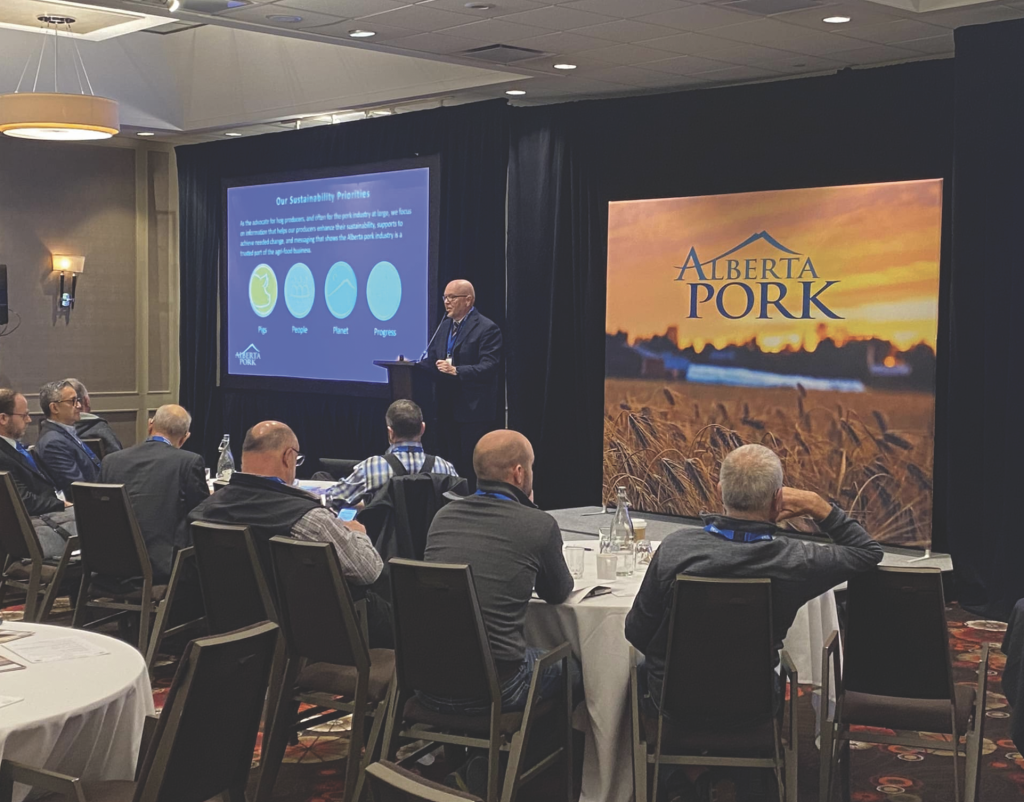
High costs continue to plague a pork production system that should be the envy of the world, says the chair and the executive director of Alberta Pork.
The corporation held its 54th Annual General Meeting in Calgary late in November, laying out the realities facing producers and the strategies it has developed to help fight high costs with little of the government support offered to other commodities, including beef, poultry and field crops.
“Our big thing is trying to look at where we are going in the future and just make everybody aware, you know, it’s that same story,” Executive Director Darcy Fitzgerald said in an interview with Prairie Hog Country.
“The price may have gone up a little bit for pigs (in) the last couple of years, but inflation has taken all that away in higher costs of production. We’re just looking at this, and saying people are paying a lot, but we’re not receiving enough to maintain it.”
There are many factors that should place Alberta producers in very strong marketing conditions, including a consumer trend to purchase more pork with the rising price of beef and chicken. The quality of pork produced here is unexcelled and Alberta offers a great environment for raising livestock. Additionally, there is good access to processing here and possibly room for more processors, said Fitzgerald.
But the dark colours on the canvas include the high costs, not just of feed, but of hiring people and of building or renovating facilities, he said.
“We have some of the most expensive construction costs in the world right here in Alberta, and it just goes on – high wages, high cost for building materials, concrete, everything is uber expensive in Alberta, and it’s unfortunate because it’s still a great place to raise pigs.”
“We have great processing facilities here. We have a population that’s young and growing. Between Alberta and BC, you know, we rival Quebec. We’re already past their population between the two of us and (still) growing.”
Part of the challenge for Alberta producers is to capture that growing market and encourage people to seek out domestic pork as a viable source of lean meat, said Fitzgerald. That starts by encouraging restaurants to place more pork options on their menus so people can see the great choices of which they may not be aware.
Along that same line, Alberta Pork is working with Federated Co-ops to help introduce consumers to different cuts and methods of preparing pork products, beyond the familiar sausages, hams and bacon.
“We’ve got an amazing industry like we have an amazing pork product. We are world class leaders in all the programs we have to prove that we have food safety, animal care, traceability, bio-security – we’re doing these things.
“Others are envious of what we’re doing, and when we look at this, the Canadian consumer has an amazing product at their disposal.”
The question, he said, is how is that maintained and supported here at home?
Alberta Pork continues to push government and industry for more transparency in pricing and continues to pressure the Alberta government for the same level of drought relief that has been offered to other livestock commodities.
Without a fair return on their investments, producers are eventually driven out of the industry, and once they’ve left, they don’t come back, said Fitzgerald.
“We all have to share that value that the consumer is giving us. And you know, it’s just not sustainable if we don’t.”
Fitzgerald would not speculate on whether Alberta’s pork industry is reaching a critical mass at which the industry would no longer be viable, stating instead that other areas of the world are experiencing similar issues, largely in the aftermath of the coronavirus pandemic that broke early in 2020.
COVID-19 had a massive and lingering impact on economies, production systems and delivery systems around the world, while African Swine Fever has devastated markets all over the globe.
The business portion of the AGM was followed by presentations from a respected group of speakers including Red Deer-based swine veterinarian Egan Brockhoff, who offered an update on the global ASF picture and on the prevention and preparation programs set up in Canada.
Also in the spotlight were Stephen Heckbert, executive director of the Canadian Pork Council and CPC Policy Director Katerina Kolemishevska. Heckbert offered an update of activities at the CPC while Kolemishevska spoke about navigating the future for sustainable solutions in pork production. Prof. Sylvain Charlebois from Dalhousie University gave his insight concerning the pork industry through the consumer’s lens and economist Brett Stuart gave an update on global pork and agricultural markets.

The bright spot on the canvas this year is an opportunity offered to Alberta Pork to sponsor and participate in the annual Alberta International Business Competition, held at Jasper earlier in November. Judges included Fitzgerald and other industry leaders.
The competition drew teams from 12 business schools; six in Canada and six from outside the country. Teams were given 30 hours to analyze Alberta Pork’s business strategies, develop proposals that would improve pork industry profitability, and then present their proposals to a panel of judges. Judges were split into groups, so no one has yet seen all the presentations, said Fitzgerald. Regardless, he is looking forward to reviewing the case studies in the coming weeks and extracting information that will be of benefit to the corporation and the producers it serves.
“We’re lucky that they chose us and let us work on a case study with them,” said Fitzgerald.
“I think ours was quite unique because it was looking at the whole industry and what they might be able to do to help us out. I would say to any business, that would be a great thing for them to do to be a sponsor. It is amazing what you get back from these.”
The team from University of Florida’s Warrington College of Business won first place in the 30-hour competition, hosted by the University of Alberta School of Business. Other Canadian universities that took part were the Northern Alberta Institute of Technology, Rotman School of Management at the University of Toronto, John Molson School of Business at HEC Montreal and the University of Prince Edward Island. International competitors came from the Dana Marla School of Business and University of South Carolina, Universidad Pan Americana Ciudad de Mexico, Rotterdam Business School in the Netherlands, HKU Business School in Hong Kong and Chulalongkorn University in Thailand.
Fitzgerald expects analyzes from the competition will be shared with Alberta Pork and its members after competition organizers have had a chance to work through the presentations. •
— By Brenda Kossowan





